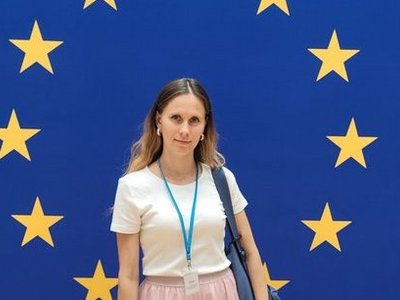

From Odesa to Graz: Learning to Adapt
Svitlana Andreichenko is Professor in International Law, Head of the Department of International Law, and Comparative Law at the International Humanitarian University in the city of Odesa, Ukraine. Since February 1, 2022, Svitlana Andreichenko has been conducting her research at the Institute of International Law and International Relations at the University of Graz. “After the war outbreak, Ms. Andreichenko found herself in a different reality soon after arrival. Being concerned about the future of her country and her family, her research focus and interests shifted to questions of international law related to the Russian aggression against Ukraine. Despite personal hardships, she, along with other Ukrainian colleagues, has actively engaged in researching the right to self-defense of Ukraine under international law.”, - reports Gerd Oberleitner, Professor of International Law and the Director of the Human Rights Centre at the University of Graz, UNESCO Chair in Human Rights and Human Security at the Law Faculty of the University of Graz, and supervisor of Ms. Andreichenko, about her first months at the University of Graz.
Examining the Problems of International Responsibility amidst the Russia’s war on Ukraine
Initially funded by the Scholarship Foundation of the Republic of Austria and later under the Ernst Mach Grant Ukraine, Ms. Andreichenko’s research delves into the important topic of “Collective Self-Defense and Collective Security under Contemporary International Law.” Her work is particularly significant as she is examining complex legal issues surrounding state assistance to Ukraine amidst the ongoing conflict. She explores questions that concern international community such as the changing dynamics of state neutrality, obligations arising from Ukraine’s renunciation of nuclear weapons, supply of weapons and other assistance to Ukraine. Her paper, “Supplying Ukraine with Weapons due to the Russian Aggression: Legal Justification,” published in the Graz Law Working Paper Series, and her insights on a Special International Criminal Tribunal for Ukraine, already showcase her significant contributions to the field. “Conduction of the research under the Ernst Mach Grant – Ukraine, is a crucial step on the way to the next milestone of my comprehensive further detailed research on the problems of international responsibility and protection of human rights.”, - reports Ms. Andreichenko.
Fostering Collaboration within the Global Academic Community
At the University of Graz, Svitlana Andreichenko has immersed herself in a rich academic environment. She collaborates with leading Austrian law experts like Prof. Dr. Gerd Oberleitner, Prof. Dr. Erika de Wet, and Prof. Dr. Wolfgang Benedek. Her involvement in preparing the OCSE Mission’s report on violations of international humanitarian and human rights law, war crimes and crimes against humanity committed in Ukraine since 24 February 2022, and her participation as a speaker in significant conferences, further highlights her active engagement with critical international law issues. “We see a clear value in learning from each other, provide access to our visiting guests to our resources, see them engaging with our students, and jointly reflect and work on issues. Apart from the academic exchange on our mutual research interests, this collaboration also brings the situation in Ukraine closer to home, which is emotionally challenging.”, - says Prof. Dr. Gerd Oberleitner.
Impact on Austrian-Ukrainian Research Cooperation
Cooperation between the University of Graz and Ukrainian higher education institutions is set to continue beyond the research stay of Ms. Svitlana Andreichenko. Having the relevant experience of collaborating with Ukrainian researchers, the Human Rights Centre at the University of Graz successfully applied for K2 Erasmus+ cooperation partnership in higher education. The project titled “Promoting Academic Freedom in Ukraine (FreeAc)” aims to mitigate the effects of the loss of talent and brain drain in Ukraine by strengthening inter-institutional cooperation with EU EHIs and the freedom of the Ukrainian academia to research, learn, teach, and disseminate research outcomes. Furthermore, it supports the rebuilding of the Ukrainian higher education sector in the European Higher Education Area (EHEA) in line with its values. Three Ukrainian universities, including the home institution of Ms. Andreichenko, the International Humanitarian University in Odesa, have already joined the consortium. The cooperation of the University of Graz with Ms. Andreichenko will continue further in the framework of this new important project.
Beyond Academia: A Personal Tale of Resilience
Ms. Andreichenko's journey is not just about academic achievements. As a mother of two, she has navigated personal challenges amidst the war in Ukraine. The support from the University of Graz, BMBWF and OeAD GmbH, as well as volunteers in Graz has been instrumental in providing a semblance of normality and safety for her and her family. Professor Andreichenko's involvement in the OeAD scholarship programmes transcends research and serves as an inspiration to all OeAD scholars and the broader academic community.
